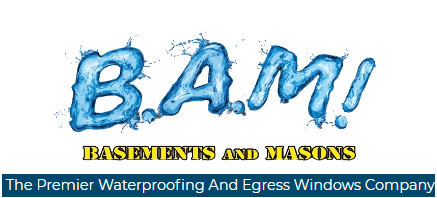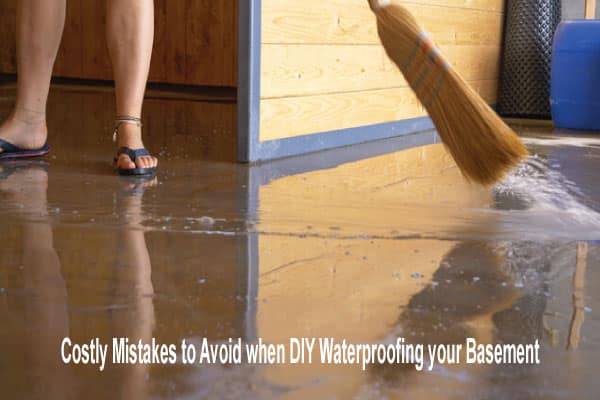A basement is an essential part of a home that provides additional living space and serves as a storage area. However, it can also be a source of headaches for homeowners, especially when water infiltration occurs. Water intrusion in the basement can lead to mold growth, structural damage, and other serious problems.
For this reason, many homeowners may attempt to waterproof their basement on their own. DIY basement waterproofing can seem like a cost-effective solution, but it can lead to costly mistakes if done improperly. In this blog post, we'll go over some common DIY waterproofing mistakes to avoid.
Ignoring the source of the problem
Water infiltration in the basement is often a symptom of a more significant problem, such as poor drainage or foundation issues. DIY waterproofing efforts may be in vain if the root cause of water intrusion is not addressed. For instance, if there are cracks in the foundation, sealing them won't prevent water from seeping in. Instead, it's crucial to identify and address the underlying cause of the problem, whether it's improving drainage around the home, fixing cracks in the foundation, or repairing damaged pipes.
Sealant not Recommended
One of the most common mistakes that homeowners make when waterproofing their basement is using the wrong type of sealant. Not all sealants are created equal and using the wrong one can lead to inadequate protection against water infiltration.
For instance, using a silicone-based sealant on concrete walls can lead to peeling and cracking, as it doesn't bond well with the surface. On the other hand, an epoxy-based sealant may be too rigid, leading to cracks and leaks over time. It's essential to use a sealant that is designed specifically for the material you're working with and provides the appropriate level of flexibility and adhesion.
Applying too little or too much sealant (sealant is not recommended)
Applying too little sealant won't provide enough coverage, while applying too much can cause the sealant to bubble and crack. Each waterproofing product comes with specific instructions that must be followed. Failing to follow these instructions could result in a failed waterproofing job. For example, some products require multiple coats, while others need a specific drying time between coats. Make sure you read and follow the manufacturer's instructions carefully to avoid any mishaps.
Ignoring Proper Preparation (Sealant highly not recommended)
Proper preparation is crucial when waterproofing a basement, and many homeowners overlook this critical step. Before applying any sealant or coating, the surface must be thoroughly cleaned, dried, and free of any debris. Failing to prepare the surface adequately can compromise the effectiveness of the sealant and lead to premature failure.
Not addressing drainage issues
Poor drainage outside your home can contribute to basement water problems. Make sure your gutters and downspouts are functioning properly, and the soil around your foundation slopes away from the house. Failure to address these issues will only lead to more water problems in the future.
Underestimating the Complexity of the Task
Waterproofing a basement may seem like a straightforward task, but it can be more complex than many homeowners realize. Depending on the extent of the water infiltration and the underlying issues, it may require specialized equipment and expertise to fix. Attempting to tackle a problem that's beyond your skill level can lead to costly mistakes and further damage to your home.
Using Ineffective or Unsafe Materials (Sealants not recommended)
Not all waterproofing products are created equal, and some may be ineffective or even dangerous to use. For instance, using a flammable sealant in a basement can create a fire hazard, and using a toxic product can pose health risks to you and your family. It's essential to do your research and choose products that are safe, effective, and appropriate for the job.
Not hiring a professional
If you're not confident in your DIY skills, it's best to hire a Basement Waterproofing professional. They have the experience and expertise to identify the root cause of the problem and provide a long-lasting solution.
In conclusion, basement waterproofing is not a DIY project to be taken lightly. Avoiding the common mistakes listed above will help ensure a successful waterproofing job. If you're unsure about how to proceed, it's best to consult a professional waterproofing contractor to assess the problem and provide the appropriate solution. Remember, a dry basement is essential to the health of your home and family, and taking the right steps to waterproof it is critical.
Call your Premier Basement Waterproofing and Egress Company
When it comes to Basement waterproofing repairs, it is important to find a qualified and reputable contractor who can accurately assess the damage and provide quality repairs. Be sure to ask for references, BBB ratings and read reviews online to make sure that the contractor you choose has a good history of successful projects.
When done correctly, basement repair can provide significant benefits for homeowners by ensuring the safety and security of their homes. Do your research and contact a reputable contractor to have them evaluate your home’s foundation and discuss any necessary repairs. With the right contractor on the job, you can rest assured that your home is safe and secure for years to come. If you’re in Des Moines IA, or surrounding areas you can’t go wrong contacting BAM Basements and Masons for basement waterproofing, foundation repairs and egress window services. We are a BBB A+ company with over 30 years of experience fixing all types of foundation issues. Contact us today to learn more.
Tags:basement waterproofing contractor near me, interior basement waterproofing system, basement waterproofing des moines iowa


